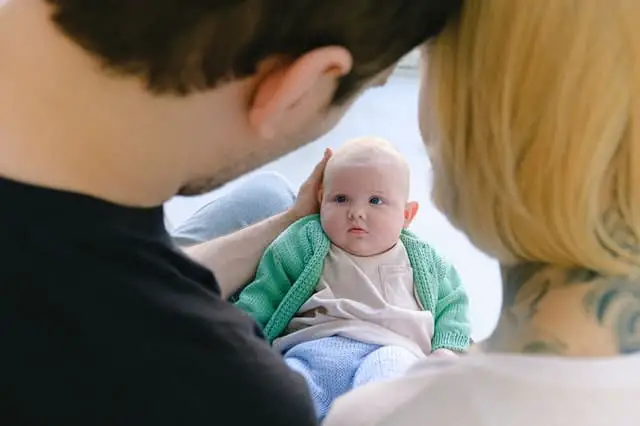A common question from moms is – is it ok to send my baby to daycare at 6 weeks? The answer is, sending a baby to daycare at 6 weeks depends on various factors such as the length of your parental leave; your partner’s ability to take leave; your financial responsibilities; and whether you have other available childcare options, such as relatives or in-home care. But most experts agree that the longer you can wait, the better. This helps you get some time to establish a secure attachment, for the umbilical cord to heal, to figure out feeding and sleep patterns, and for both parents and baby to adjust to all the stuff that comes with a baby. Since many working parents only get a six-week parental leave and their families rely on their income, waiting until the baby is older is not always an ideal option.
Hey! By the way… any links on this page that lead to products on Amazon are affiliate links and I earn a commission if you make a purchase. Thanks in advance – I really appreciate it! .
Most daycare centers will not take babies under 6 weeks of age, and many facilities are not equipped to handle the special needs of babies born prematurely or with special medical concerns. However, they start taking babies when they are past the 6 weeks mark. But is it really a good idea to send a 6 week old to daycare? To help you figure out the answer to this question, here are some pros and cons of sending a 6-week old baby to daycare.
Pros and cons of sending a 6-week old baby to daycare
Pros:
- Safety assurance: A proper daycare need to have a special license to operate. They go through several inspections of safety measurements before they are allowed to work. Whereas, in-home daycare (a daycare in a home setting where an individual takes care of a group of 5 or 6 babies) is less regulated while private nannies or family relatives care requires no regulations at all. So, it gives you peace of mind to know that your babies are in a safe environment.
- Consistency: Unlike a private nanny or other caregivers, a proper daycare center runs on schedule even when one of its teachers is on vacation or sick.
- Less costly than a private nanny: While daycares are more pricey than an in-home daycare or a family member who may provide their services for free, it is less expensive than hiring a private babysitter or nanny.
- A good childcare facility provides adequate various stimulations for babies according to their ages. These stimulations are provided through movement, adult interaction, various play materials, outdoor time, and free play, and organized activities.
- Skill acquisition: According to research, kids who attend a good quality daycare center are slightly better than other children in acquiring language and cognitive skills.
- Consistent Location – If you choose a preschool that has both infant and toddler programs, your baby can stay in one place until they are ready for kindergarten. This can make stages like separation anxiety easier to get through and create a general sense of belonging and security for your little one.
- Your baby may be able to achieve their developmental milestones at a quicker pace than stay at home babies. As the daycares have special teachers for infants and toddlers.
Cons:
- Sickness: Especially for babies, who haven’t built up their immunity systems yet. Going to a daycare facility can result in easily catching colds and other contagious diseases. If your child gets sick, the facility will likely ask you to keep them home, which means you must take the day off or find alternate childcare until they are well enough to go back.
- Less attention: As a proper daycare center has lots of babies, so it is difficult to pay special attention to every baby individually. This isn’t the case in in-home daycares and when family members are looking after the baby as they don’t have to look after a bunch of babies.
- Costly: While considerably less expensive than a nanny, childcare programs can cost you a small fortune. Prices vary depending on where you live, but the average cost of a full-time, quality daycare program for babies and toddlers in the U.S. is about $11,000 per year. Also, these costs can increase if you’re late picking up your baby, or in case they are sick and you miss work or pay someone else to stay home with them.
- It’s common for daycare centers to be full and your baby will often be put on a waiting list till a spot opens up for them.
- You may not be able to make a secure bond with your newborn and they may not be as attached to you as other babies are with their parents.
When should I send my baby to daycare?
Choosing to send your baby to daycare and returning to work is a big decision. For some mothers, it’s a painful experiment hoping to help an only child get some more social interaction. Other mothers rush back to work for a few days a week just so they can have some sanity in an otherwise nappy and bottle filled life.
Whatever your reason for sending baby to daycare at 6 weeks, you need to remember that it’s yours alone, and only you know the circumstances. If you want your child to stay at home – that’s great. But if you want to return to work, that’s great too!
Each baby and situation is different – so in the end – it’s your decision.
Now you have the answer to the question – sending baby to daycare at 6 weeks- is it ok? Deciding the best time to put your baby in daycare depends on their personality and your work schedule. There is no perfect age of sending your baby to childcare centers as each baby adjusts to the daycare environment differently. Keep in mind that there is no such thing as a perfect age of sending a baby to daycare as it varies for every parent. So, the best thing you can do is relax to make your decision and once that decision has been made, eliminate all the second-guessing because your positive approach will have a great effect on your baby.

